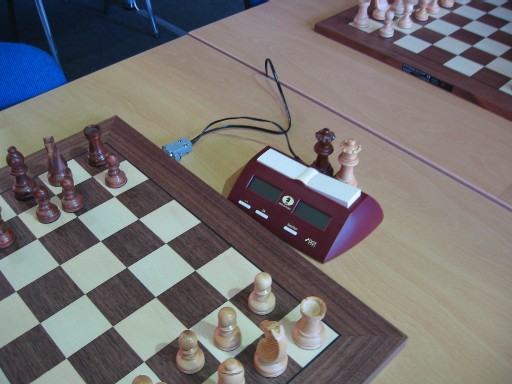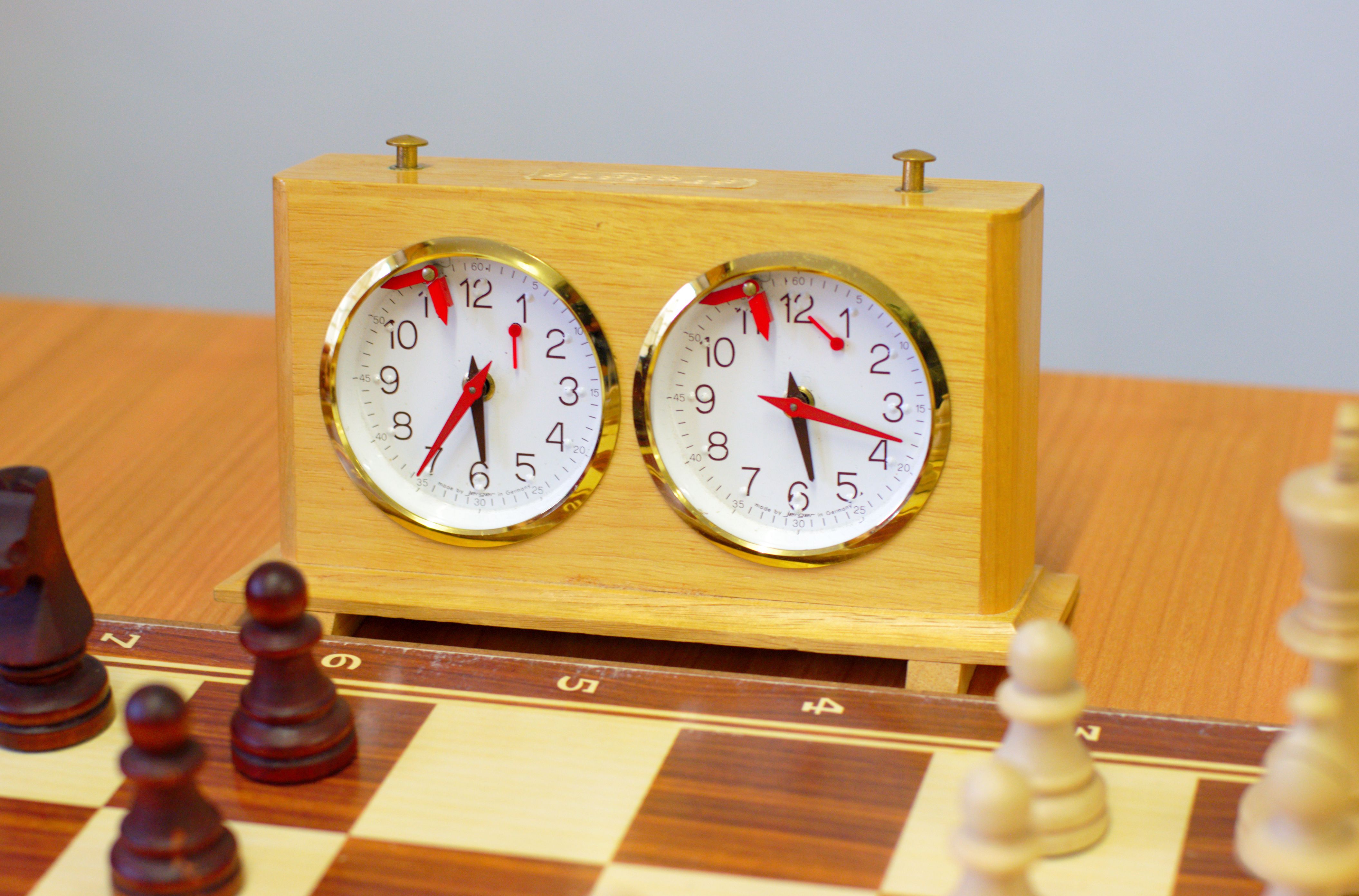Chess players use different time controls to add excitement and challenge. Blitz, rapid, and classical time controls each offer unique experiences.
Understanding these settings can enhance your game. Chess clocks regulate the duration each player has to make their moves. Blitz games are fast-paced, testing quick thinking. Rapid games offer a bit more time, blending speed with strategy. Classical time controls provide the most time, allowing deep thought and planning.
Knowing how these time controls work is vital for anyone looking to improve their chess skills. Whether you enjoy the thrill of blitz, the balance of rapid, or the depth of classical, grasping these settings will enrich your chess experience. Let’s dive into each type and see what makes them special.

Credit: en.wikipedia.org
Introduction To Chess Clocks
Chess clocks are essential tools in modern chess. They ensure fair and timed gameplay. Whether you are playing in a tournament or a friendly match, understanding chess clocks is key. There are different time controls, such as Blitz, Rapid, and Classical. Let’s dive into the world of chess clocks.
Purpose Of Chess Clocks
Chess clocks serve multiple purposes:
- Regulate time: Each player has a set amount of time for their moves.
- Prevent delays: Ensures the game progresses without unnecessary pauses.
- Fair play: Both players have equal time to think.
Without chess clocks, games could last indefinitely. This would be unfair and impractical, especially in tournaments. Chess clocks keep the game exciting and challenging.
History Of Chess Timing
The history of chess timing is fascinating. The first recorded use of a chess clock was in the 19th century. Before clocks, players could take as long as they wanted. This led to very long games.
In 1861, chess clocks were introduced. Early clocks were simple sand timers. These evolved into mechanical clocks with two faces. Each face tracked one player’s time.
In the 20th century, digital clocks came into play. These allowed for more precise timing and additional features. Today, digital clocks are the standard in most tournaments.
Here is a brief timeline of chess timing:
| Year | Event |
|---|---|
| 1861 | First use of chess clocks |
| 1883 | First mechanical chess clock |
| 1980s | Introduction of digital chess clocks |
Understanding the history helps appreciate the evolution of chess and its time controls.
Blitz Time Control
Blitz Time Control is an exciting format in chess. It features short time limits that require quick thinking and fast moves. This format keeps players on their toes and makes for thrilling matches. Let’s delve deeper into what defines Blitz Time Control.
Definition Of Blitz
Blitz chess is a fast-paced version of the game. Each player has a limited amount of time to make all their moves. The total time for each player usually ranges from 3 to 10 minutes. This high-speed format tests a player’s quick decision-making skills.
Popular Blitz Settings
Several Blitz settings are popular among players. The most common is the 5-minute game. Each player gets 5 minutes to complete their moves. Another popular setting is the 3-minute game. Some players also enjoy a 3+2 setting. This means 3 minutes per player plus a 2-second increment per move.
Strategies For Blitz
Quick thinking is key in Blitz chess. Players often rely on intuition rather than deep analysis. Practicing common openings can save time. Developing a good endgame technique is also crucial. Managing time effectively helps avoid losing on the clock. Always keep an eye on the timer. Stay calm under pressure to make the best moves quickly.
Rapid Time Control
Rapid Time Control is a popular setting in chess tournaments. It strikes a balance between the fast-paced Blitz and the more deliberate Classical time controls. Many players enjoy this format because it provides sufficient time to think while keeping the game moving at a brisk pace.
Definition Of Rapid
Rapid time control refers to a game where each player has between 10 and 60 minutes. It allows for thoughtful play without the lengthy duration of Classical games. This time control is often used in both casual and competitive play.
Common Rapid Settings
The most common Rapid settings range from 15 to 30 minutes per player. Sometimes, a small increment per move is added, such as 10 seconds. This helps prevent flagging, where players lose simply because they run out of time.
Strategies For Rapid
In Rapid games, time management is crucial. Players must balance speed and accuracy. It’s important to avoid spending too much time on any single move. Quick, confident decisions often lead to better overall performance.
Opening preparation can give you an edge. Knowing your opening moves well saves valuable time. Middle-game tactics also play a significant role. Focus on simple, effective plans that can be executed quickly.
Endgames in Rapid require precision. Practice common endgame scenarios to improve your speed and accuracy. Remember, every second counts in Rapid chess.
Classical Time Control
Classical time control in chess is the oldest and most traditional format. Players have a generous amount of time to think through their moves. This allows for deep strategy and thoughtful gameplay. Classical games can be long, testing the endurance and concentration of the players.
Definition Of Classical
Classical time control gives each player more than 60 minutes. This time can go up to several hours, depending on the tournament rules. The slower pace allows for detailed analysis and strategic depth. It’s the format used in most major chess championships.
Standard Classical Settings
Most classical games have a time control of 90 minutes for the first 40 moves. After reaching 40 moves, players get an extra 30 minutes. In addition, there is often a 30-second increment per move. This increment helps prevent players from running out of time entirely.
Strategies For Classical
In classical chess, patience is key. Players should focus on long-term planning and position evaluation. It’s important to manage time well. Spend more time on critical positions and less on obvious moves.
Openings should be well-prepared. Players should also be ready for different types of positions. Middle-game strategy often involves deep calculation and understanding of pawn structures. Endgames require precise technique and knowledge of common patterns.
Increment And Delay
Understanding the concepts of Increment and Delay in chess clocks is crucial for players. These settings can significantly affect game dynamics. They bring unique strategies into play, especially in Blitz, Rapid, and Classical formats.
What Is Increment?
Increment adds extra seconds to the clock after each move. If you play a move, your clock gains a few seconds. This helps avoid time pressure. For instance, a 5+3 setting means 5 minutes per player and 3 seconds added per move.
What Is Delay?
Delay pauses the clock for a few seconds before it starts ticking down. The clock waits a bit before counting down. This gives players a brief period to think without losing time. For example, a 5/3 delay means 5 minutes per player and a 3-second pause before the clock moves.
Impact On Game Play
Increment and Delay change game strategies. Increment allows for more precise moves in time trouble. Players can think quickly and use the added seconds wisely. Delay, on the other hand, provides a buffer period. It reduces the risk of flagging in critical moments. Both settings help maintain game quality. Players can avoid hasty moves due to severe time pressure.
Choosing The Right Time Control
Chess is not just about strategy. Time control is also crucial. Different time settings can change the game’s dynamics. It’s important to choose the right one. Let’s explore the key factors to help you decide.
Factors To Consider
Think about the type of game you prefer. Blitz games are very fast-paced. They are exciting but can be stressful. Rapid games offer a balance. They are quicker than classical but allow more time to think. Classical games are slow and methodical. They allow deep thought and planning.
Consider your skill level. Beginners might struggle with blitz. Advanced players often enjoy the challenge. Your schedule matters too. Blitz games fit busy lifestyles. Classical games require more time.
Player Preferences
Some players love the adrenaline of blitz. Others prefer the calm of classical. Your personality can guide your choice. Do you enjoy quick decisions? Or do you like to think deeply? Your choice might also depend on your goals. Are you playing for fun or to improve your skills?
Trying different formats can help you decide. You might find a preference you didn’t expect. Listen to your instincts and enjoy the process.
Event Requirements
Events often have specific time controls. Check the rules before you join. Tournaments might use different settings. Blitz tournaments are common. Rapid events are also popular. Classical games are standard in championships.
Knowing the event requirements helps you prepare. It ensures you are ready for the challenge. It also helps you choose the right event for your style. Always read the event details carefully.
Impact On Player Performance
Chess clock settings significantly affect player performance. Blitz demands quick thinking, rapid requires balanced speed, and classical allows deep strategy.
Chess clock settings can significantly impact player performance. The time control chosen for a game influences a player’s strategy and decision-making. Different settings like Blitz, Rapid, and Classical each bring unique challenges.Speed Vs. Accuracy
In Blitz games, players have very limited time to think. This often leads to quicker decisions and more mistakes. Rapid games offer a bit more time, balancing speed and accuracy. Classical time controls give players ample time to think deeply. As a result, players tend to make fewer errors. Each setting tests a different skill set.Psychological Effects
Chess clock settings also affect players’ mental states. Blitz games can be stressful due to the fast pace. Rapid games reduce this stress but still maintain some pressure. Classical games allow for a calmer, more thoughtful approach. Each setting requires mental resilience and adaptability.Adaptation Techniques
Players often develop specific strategies for each time control. In Blitz, they might memorize common openings to save time. Rapid games might see a mix of quick thinking and deeper analysis. Classical games allow for thorough planning and complex strategies. Adapting to each setting is crucial for consistent performance. “`
Credit: www.chess.com
Technological Advances
Chess clocks have evolved significantly with technological advances. These innovations enhance the playing experience and ensure fair play. Time controls for Blitz, Rapid, and Classical games benefit greatly from modern technology.
Digital Chess Clocks
Digital chess clocks offer precise time management. They feature functionalities like delay and increment, which are crucial for fair play. Players can set specific time controls for Blitz, Rapid, and Classical games. These clocks display time digitally, making it easier to track remaining time.
Benefits of digital chess clocks:
- Accurate timekeeping
- Easy to set and adjust
- Multiple time control options
- Visual and audible alerts
Smartphone Apps
Smartphone apps provide a convenient alternative to physical clocks. They offer various features such as customizable time settings, alerts, and game tracking. Players can use these apps to practice or play casual games with friends.
Advantages of smartphone apps:
- Portability
- Cost-effective
- User-friendly interfaces
- Integration with online platforms
Future Trends
Future trends in chess clock technology include AI integration and smart wearables. AI can analyze time usage patterns and suggest improvements. Smart wearables can track player movements and provide real-time feedback.
Expected future features:
- AI-driven time management
- Wearable technology integration
- Enhanced connectivity with online platforms
- Voice command functionalities
These advancements will further refine the chess playing experience. They ensure that both casual and competitive games remain exciting and fair.

Credit: www.uscfsales.com
Conclusion
Choosing the right chess clock setting is important. Blitz games are fast and thrilling. Rapid games offer a balance of speed and strategy. Classical games allow deep thinking and planning. Each format has its own charm and challenges. Experiment with different settings to find your favorite.
Enjoy the game, improve your skills, and have fun. Happy playing!
chessmantras.com is a participant in the Amazon Services LLC Associates Program, an affiliate advertising program. As an Amazon Associate, we earn from qualifying purchases made through our links.







